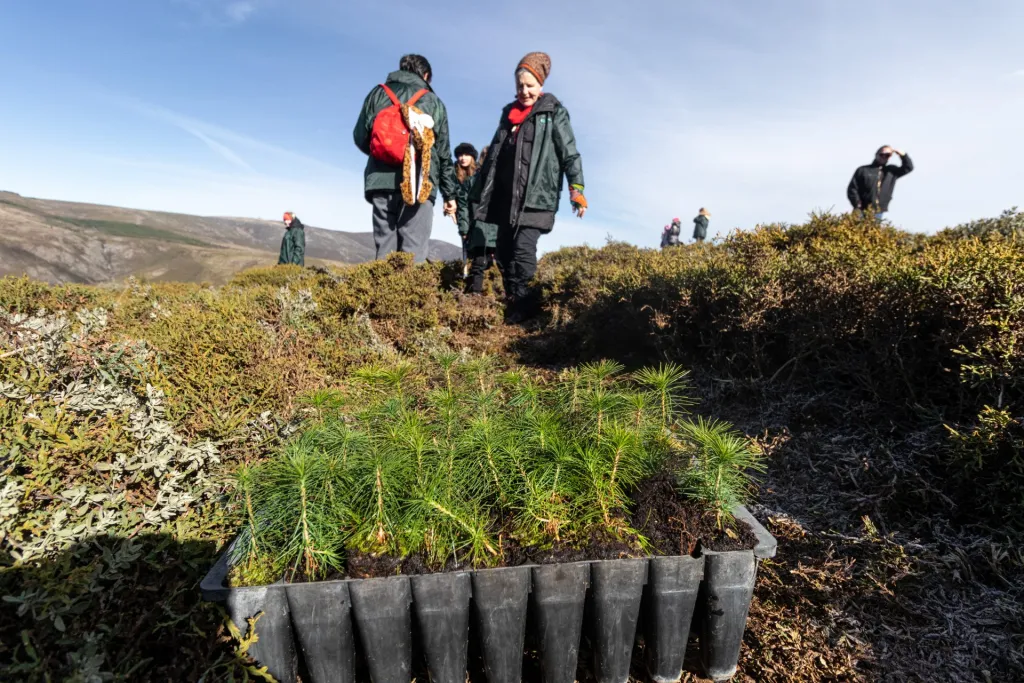Reforestation, a way of repairing " trauma" and favouring social integration
Article by EFE Verde.
Repairing the wounds of traumatic phenomena, such as war or the massive fires that devastated a large part of Portugal's forests in 2017, involves different strategies and actions: one of them, planting trees, which in addition to restoring the burnt land can contribute to the integration of migrants into the community.
This was explained to EFE by clinical psychologist Sandra Tavares, in a reforestation activity organised as part of the European Life Terra project, in which several dozen volunteers from a migrant centre planted pine and oak trees in the Serra da Estrela, in northern Portugal.
Fires in 2017
This mountain range, at the foot of which lies the village of Manteigas, was in the summer of 2017 one of the areas most affected by the forest fires that left 64 people dead, more than 250 injured and many others with anxiety symptoms that in some cases persisted for months, says Tavares, who specialises in post-traumatic stress disorder.
"This landscape reminds me of Crimea," says Valentina Dieieva, who came to Portugal almost a year ago from her hometown of Dnipro, where she left some of her relatives - her parents and siblings - to flee the war.
This editor, who worked for a media company in her native Ukraine, moved to the city of Bakhchisaray, in Crimea, in love with her husband, where her son was born and where she lived for two years.
Although her idea was to buy the house in Crimea and stay there for the rest of her life, in 2014 Russia invaded the region and Dieieva and her family were forced to return to Dnipro.
When the conflict with Russia escalated in early 2022 and attacks began, Dieieva packed her bags again and left for Poland, where she boarded a bus to the Portuguese town of Fundao, where she now lives with her immediate family.
A nature lover, she decided to take part in the tree planting organised one Sunday in January by the European Life Terra project, where she was able to meet the other volunteers, who interacted in Ukrainian, Portuguese and English as they helped to repopulate the mountain range with native trees, including a species of pine tree that, coincidentally, is also very common in Ukraine, at the other end of Europe.
Fires in 2022
The Serra da Estrela was burnt again in the long heatwave that, like in Spain, affected the inhabitants of Portugal last July.
"This latest fire had a very serious impact on people's lives, both in business and social terms," laments António Miraldes, executive secretary of the Serra da Estrela association of municipalities.
Miraldes explains, for example, the economic and social impact of the cancellation of bookings in tourist accommodation, since "people stopped coming because they were afraid to return to the mountains once the fires had broken out".
This, in a village that once lived on butter (the product to which it owes its name) and other dairy products, but where tourism is becoming increasingly important, was an economic setback.
The idea of involving migrants in the plantation was to restore the ecosystem and, at the same time, to favour "a better integration of the refugees from the war in Ukraine and of some of the immigrant communities that we also have in our territory", Miraldes explains, and to show these people "what our territory can offer in this harmony".
Reforesting, a "connection with life".
For Sandra Tavares, actions such as reforestation are very positive for people who have suffered traumatic episodes, because "this connection with nature is a connection with life", she says.
The psychologist, who coordinates a social intervention project at the Gouveia City Council, explains that many of the people who participated in the planting took care of farms, gardens or other natural spaces in their places of origin and, therefore, taking care of nature now brings them back to that state of tranquillity that, like Dieieva, they enjoy so much.
"Taking care of nature is a bit like taking care of ourselves," she says, noting that planting is also an opportunity for migrants to give back to their host community, and also "to generate a certain social identity" and be part of that group, which is key "to feel good where they are now".
"This specific area is important because it burned down last summer, people are very worried and felt it as a tragedy; and, at the same time, there is a large community of migrants here," argues Carlos Carvalho, forester and coordinator of the Life Terra project in Portugal, who also believes that the strength of this plantation lies in the "hope" of restoring life to a devastated area.
